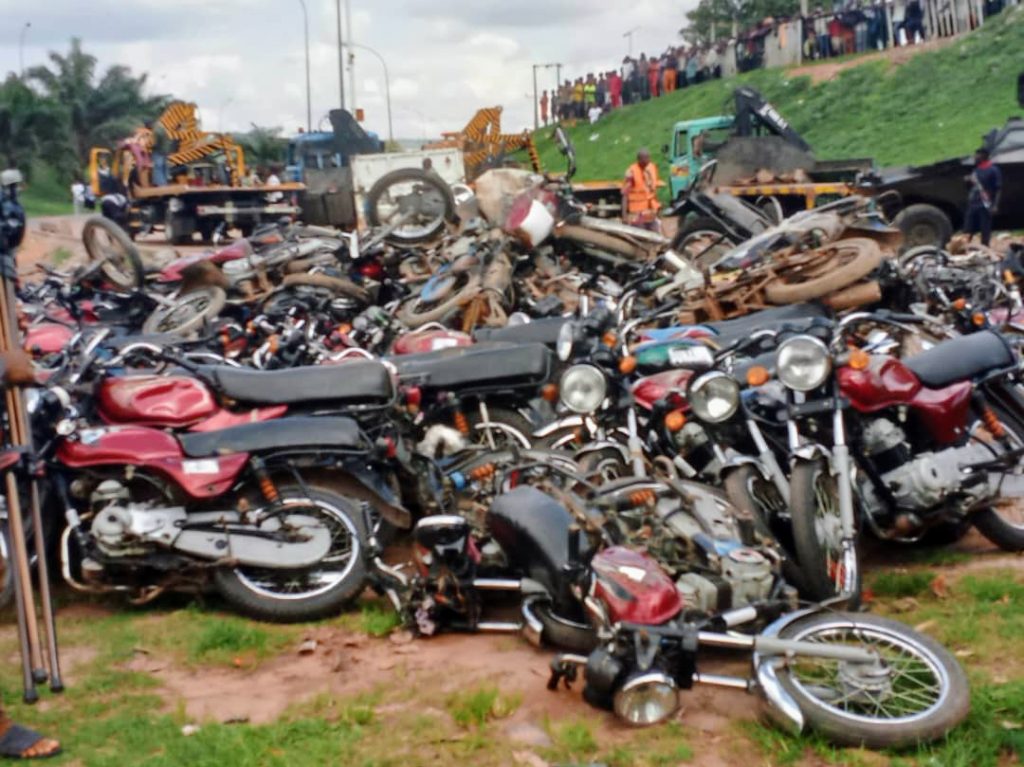The Directorate of Road Traffic Services (DRTS) under the Federal Capital Territory Administration (FCTA) has clarified that the crushing of impounded commercial motorcycles, commonly known as “Okada,” was carried out in accordance with legal provisions.
Deborah Osho, the Head of Operations at DRTS, provided this clarification in an interview with the News Agency of Nigeria (NAN) on Sunday.
On August 31, the Joint Task Force Team of the FCTA impounded and crushed 400 commercial motorcycles for operating illegally within the Abuja capital city.
The Commissioner of Police, FCT Command, Garba Haruna, who led the operation, stated that it was in accordance with the law that prohibits the operation of commercial motorcycles in the city.
Okada Ban
The Federal Capital Territory Road Transport Regulation of 2005 mandates Okada riders to operate only in designated areas, and a ban on their operation within the city center was announced in 2006.
Osho reiterated that the ban was still in effect and part of its enforcement involved the crushing of impounded Okada within the bounds of the law.
Okada operators were permitted to operate freely in areas like Gwagwalada, Bwari, Nyanya, and other suburbs of the FCT, but any Okada impounded within the city would be crushed.
She explained that the law provided two grounds for crushing impounded motorcycles: those impounded for posing security threats and those impounded with a court forfeiture order.
Osho further highlighted the reasons for the ban, including the fact that motorcycles were being used by criminals for quick getaways from crime scenes and for kidnappings in residential areas of the city.
They were also involved in criminal activities such as snatching valuables and mobile phones from unsuspecting passersby, in addition to causing a rising number of accidents.
She mentioned that the security agencies considered commercial motorcycles as a security threat within the city and wanted them removed from city routes.
Awareness of the Ban
Regarding awareness of the ban among operators and consequences when caught, Osho stated that riders had been sensitized about the ban even before its enforcement in 2006.
There were also meetings with their leadership by security and government agencies to remind them of the ban and the potential consequences if their Okadas were impounded.
Peter Olumuji, the Secretary, Command and Control of the FCTA Enforcement Task Force, added that crushing the impounded motorcycles was intended to strengthen the enforcement of the ban.
He explained that previously, when a motorcycle was impounded, the owner would face a mobile court where a fine of N2000 or N3000 would be imposed.
After paying the fine, the Okada would be released to the owner, allowing them to return to the streets.
To address this challenge, the ban was amended to include the forfeiture of impounded commercial motorcycles to the FCTA.
He said:
“This means that once an okada is impounded, it becomes the property of the FCTA.
“While this appeared to solve the problem, it also came with a challenge, following allegations that officials of DRTS collect bribes and release the motorcycles to the owners.
“It was to address this problem that security agencies and the enforcement taskforce opted for crushing of impounded okada.
“This did not only solve the problem of alleged corruption in the seizures, but also the question of economic losses”.
The secretary explained that after the motorcycles were crushed, they would be sold to recycling companies and the money deposited in a government account.
